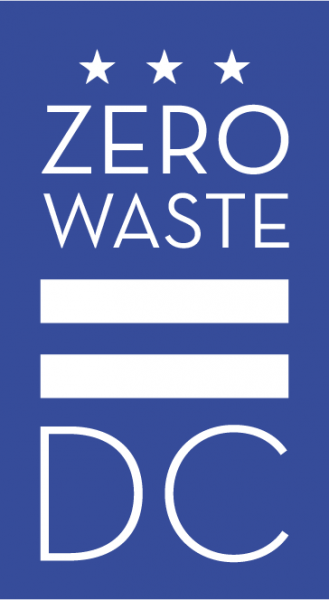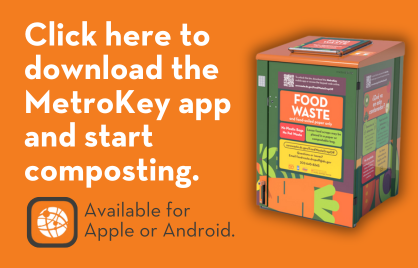DC's Department of Public Works now offers residents two options for food waste drop-off citywide:
1. (New!) Food Waste Smart Bins: These are available 24/7 and can be unlocked using the metroKEY app or an access code.
To download the metroKEY app, find the app on Google Play or the Apple App Store, or visit https://qr1.be/458A. See below for trouble shooting tips.
- For keypad access to the smart bins in 2025, use code 2-0-2-5-#. (Note: The bin at George Washington University's Kogan Plaza does not have a keypad at this time.)
2. Staffed Food Waste Drop-off Sites at designated farmers markets and community locations on Saturdays & Sundays
- There are 12 staffed weekend food waste drop-off sites citywide in all eight wards (♿)
- In case of a holiday or inclement weather, a staffed drop-off location may close if the associated farmers market also closes; please check the markets' websites for updates.
Find the Location Nearest You
Residents can drop off food waste at designated community sites and food waste bins in all eight wards through the Food Waste Drop-Off Program. The food waste collected from the smart bins and staffed weekend drop-off sites is taken to nearby composting facilities in the DC area, such as the Prince George’s County Organics Composting facility in Upper Marlboro, MD.
Food Waste Smart Bin Locations (24/7 availability)
(Note: As new smart bin sites are added, this list will be updated)
Northeast DC:
- Alethia Tanner Park: 227 Harry Thomas Way NE (Ward 5)
- Edgewood Recreation Center: 300 Everts Street NE (Ward 5)
- Union Market: 1251 6th Street NE (Ward 5)
- Swampoodle Playground: 1102 3rd Street NE (Ward 6)
- East Capitol Street NE & Benning Road (Ward 7)
- Kenilworth Recreation Center: 4321 Ord Street NE (Ward 7)
Northwest DC:
- Kogan Plaza at George Washington University (GWU): 2121 H Street NW (Ward 2)
- Bloomingdale: 102 R Street NW (Ward 5)
- Northwest One Library: 155 L Street NW (Ward 6)
Southeast DC:
- Twining Square: 2324 Pennsylvania Ave SE (Ward 7)
- Anacostia Library: 1800 Marion Barry Ave SE (Ward 8)
- Covenant House: 2001 Mississippi Ave SE (Ward 8)
- Skyland Town Center: 2728 Marion Barry Ave SE (Ward 8)
Southwest DC:
- Bellvue Library: 115 Atlantic Ave SW (Ward 8)
Staffed Food Waste Drop-off Sites (available on Saturdays or Sundays)
(Note: All sites listed below are open every weekend of the year unless noted as seasonal.)
Northeast DC:
- Monroe Street Farmers Market ♿ (Ward 5)
- Saturdays, Apr-Dec: 9 AM - 1 PM; Jan-Mar: 10 AM - 1 PM
- 716 Monroe Street NE
- First Baptist Church of Deanwood ♿ (Ward 7)
- Saturdays, 9 AM - 1 PM
- 4408 Sheriff Road NE
Northwest DC:
- Columbia Heights Farmers Market ♿ (Ward 1)
- Saturdays, Apr-Dec: 9 AM - 1 PM; Jan-Mar: 10 AM - 1 PM
- 14th Street NW & Kenyon Street NW
- Mount Pleasant Farmers Market (Ward 1)
- Saturdays, 9 AM - 1 PM
- 3200 Mt Pleasant Street NW
- Dupont Circle Farmers Market ♿ (Ward 2)
- Sundays, 8:30am - 1:30pm
- Hillyer Pl NW & Connecticut Ave NW
- Cleveland Park Farmers Market ♿ (Ward 3)
- Saturdays (Seasonal, Apr to Dec), 9 AM - 1 PM
- 3430 Connecticut Ave NW
- Univ. of District of Columbia (UDC) Farmers Market ♿ (Ward 3)
- Saturdays, 9 AM - 1 PM
- 4340 Connecticut Ave NW
- Palisades Farmers Market ♿ (Ward 3)
- Saturdays, 9 AM - 1 PM
- U Street NW & MacArthur Blvd NW
- Uptown Farmers Market ♿ (Ward 4)
- Saturdays, 9 AM - 1 PM
- 14th Street NW & Kennedy Street NW
Southeast DC:
- Eastern Market, near Rumsey Aquatic Center ♿ (Ward 6)
- Saturdays, 9 AM - 1 PM
- 635 North Carolina Ave SE
- Sycamore & Oak ♿ (Ward 8)
- Saturdays, 10 AM - 2 PM
- 1110 Oak Drive SE
Southwest DC:
- Farmers Market SW ♿ (Ward 6)
- Saturdays, 9 AM - 1 PM
- 425 M Street SW
Complete List of Items Accepted in the Food Waste Drop-Off Program
Accepted Materials ✔️
- Fruits and vegetables, salad
- Coffee grounds, paper coffee filters, loose tea, and paper and cotton tea bags
- Foods cooked in fats and oils, prepared foods, leftovers
- Moldy or expired foods
- Meat and bones (cooked or raw)
- Seafood, shellfish, fish, bivalves and mollusks
- Shells (e.g., crab shells, oyster shells, clamshells, and mussel shells)
- Dairy products (including spoiled dairy products)
- Eggs and eggshells
- Bread, grains, cereals, rice, and pasta (cooked or uncooked)
- Flour, cornmeal, and spices
- Nuts, nutshells, seeds, and beans
- Corncobs and fruit pits
- Pickles, kimchi, and fermented foods
- Food and beverage-soiled napkins and paper towels
- Pumpkins, gourds, and squash (break into smaller pieces)
- Pastries, desserts, and candies
- Cut or dried flowers and houseplants
- Uncoated paper cups, plates and bowls, greasy pizza boxes, and paper bags
- BPI-certified compostable bags
Materials Not Accepted ❌
- Yard waste (Call 311. If calling from outside DC, dial (202) 737-4404, or visit 311.dc.gov to request a yard waste pick up year-round)
- Large amounts of leftover cooking oil and grease (small amounts are acceptable)
- Produce stickers, rubber bands, and twist ties
- Plastic bags, wraps, and film
- Plastic cups, straws, takeout containers, utensils, and packaging
- Compostable and biodegradable food serviceware (e.g., plastic cups, straws, takeout containers, utensils) and all packaging (biodegradable, compostable or other)
- Plastic-lined and wax-coated paper products (e.g., cups, plates, bowls, takeout containers, and cardboard)
- Plastics, metals, foil, glass, and “styrofoam”
- Animal and human waste or bodily fluids (e.g., diapers, kitty litter, dog feces, used facial tissues, used toilet paper, baby wipes, and sanitary products)
- Animal remains, such as deceased pets and “roadkill”
- Diseased or infested houseplants, invasive plants, or contaminated soil (List of DC’s common native and invasive plants)
- Chewing gum and tobacco
- Medications (prescribed and over-the-counter)
Frequently Asked Questions
How should I bring my food scraps to a Food Waste Drop-Off Site?
-
You don't need any special equipment to participate in the Food Waste Drop-Off Program. Acceptable food waste and food-soiled paper can be gathered at home in food waste caddies, used containers, and paper or plastic bags. Some people line their food waste containers with BPI-certified compostable liners, but using a liner is optional.
When you arrive at a Food Waste Drop-Off location, empty your food waste container into the available bin(s).
- At Food Waste Smart bins, you must use the metroKEY app or the keypad access code to open the bin. In 2025, the keypad access code is 2-0-2-5-#.
- At staffed food waste drop-off locations each weekend, paper towels, spatulas, and hand sanitizer are provided for your convenience, and a Zero Waste DC team member may be available to answer questions.
Important note about bin liners (bags): While BPI-certified compostable bin liners, such as those that are made of brown paper and compostable bio-plastics, may be used as liners in food waste containers and are accepted at food waste drop-off sites, they should never go into traditional blue recycling bins. Due to the nature of flexible plastic films—compostable or not—can quickly become tangled and damage recycling equipment at sorting facilities. Therefore, plastic bin liners or bags should never be placed in a traditional blue recycling bin.
I'm having trouble accessing a food waste smart bin
We're sorry you're having trouble with one of the food waste smart bins. Here are some troubleshooting tips:
- Make sure the Bluetooth on your phone is turned on. Try turning your WiFi off and accessing the bin.
- Check that no one else is Bluetooth connected to the bin that you're trying to access. Each user has 60 seconds to access the bin before the next user can unlock it.
- If you're still having trouble, email DPW at [email protected] to help you further.
Why should I participate in this program?
- Keeping food out of your trash makes trash less attractive to rodents like rats and raccoons.
- Food scraps thrown away in the trash may end up in landfills, where they degrade and release methane gas that harms human health and the environment.
- Wasted food that is composted can be used to fertilize soil and produce more food.
- Diverting food from disposal will help the District achieve its goal to reduce waste by 80% by 2040.
- The U.S. throws away about 78 million tons of food each year, which equates to $145 billion in wasted food. (Source: ReFed.org)
How can I control odors at home?
If, in hotter months, you're having trouble with food waste smells, we have some tips. To help control odors at home, we recommend lining the bottom of food waste containers with newspaper or shredded paper and rinsing them between uses. This will help absorb moisture, which is the main source of the odors! Another tip is to store food scraps in the freezer or refrigerator between drop-offs. If you want to troubleshoot with a DPW staff member, email us at [email protected].
Some residents control odors at home by stabilizing their food waste with a grinder-dehydrator machine—several major manufacturers of these countertop appliances—and storing the dried material in a sealed container, such as a two-gallon bucket with a tight-fitting lid
Can businesses use DPW's Food Waste Drop-Off sites?
- No, food scraps from commercial sources, like restaurants, grocery stores, and office buildings, are not accepted at DPW Food Waste Drop-off Sites. Businesses should contract with a local solid waste collector (“hauler”) that can handle commercial organic waste to collect their materials. Click here for a list of registered solid waste collectors in the District.
Are there any other options for composting in DC?
- In addition to DC DPW’s food waste drop-off programs, the DC Department of Parks and Recreation (DPR) hosts a robust network of Compost Cooperatives at 50+ parks citywide. The Compost Cooperatives are volunteer-led and managed. To join one, participants must apply, participate in a one-hour training, and agree to collaborate with fellow cooperative members to maintain the small community compost sites. You can learn more about the innovative Compost Cooperative program by clicking here.
Additional questions?
Please email the Department of Public Works team at [email protected].


